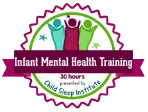My Tips For Getting The Sleep You Need to Rest, Restore, Resource, & Recover
For many of my clients, the most challenging time during the first months with their newborn is when they are awake in the middle of the night with a baby who won’t sleep. It can be exhausting on every level—physically, emotionally, and mentally. If you have ever experienced this, you may be suffering from Perinatal Mood & Anxiety Disorders (PMADs).
You may have heard the term the “baby blues,” which is a time marked by feelings of sadness and depletion. If that experience intensifies or persists longer than two weeks, then you may be experiencing a PMAD. Some symptoms of PMADs can include despair, irritability, hopelessness, frequent crying, and appetite changes. You may also have the sense that something just isn’t right, and it’s a feeling that you just can’t shake.
It’s important to realize, however, that you are not alone in this. Up to 1 out of 5 moms experiences PMADs. If you think you might be suffering from perinatal depression you can take a screening test provided by Postpartum Health Alliance, a nonprofit dedicated to supporting women, and their families, who are dealing with PMADs. You can also take steps towards getting more sleep, which is one of the most important ways to relieve PMADs symptoms.
According to the National Sleep Foundation, adults should get 7 to 9 hours of sleep at night, and getting less than that comes with many risks. It can be difficult to stay focused on routine tasks and you can find yourself making poor choices. You may experience emotional symptoms depression, anxiety, irritability, and mood swings. As any parent knows, you won’t be getting 7 to 9 hours of uninterrupted sleep at night when you have an infant. So then it becomes a question of how many hours of uninterrupted sleep do you really need.
Dr. Christina Hibbert writes, “Five hours of uninterrupted sleep every 24 hours is a physiological imperative for healthy functioning in a normal adult. It’s easy to see, therefore, that a mother who does not get 5 hours of uninterrupted sleep will further her sleep deficit and has a high likelihood of developing physical and mental health symptoms as a result.”
In other words, sleep is vital for women with PMADs. Sleep gives you four crucial things: the rest you need so you can restore, allowing you to resource the strength and resolve you need to recover.
HOW TO GET THE SLEEP YOU NEED
Naturally, during your child’s infancy, the focus is on meeting all of baby’s needs for feeding, parental attachment and basic health care tasks. But if you are struggling with PMADs you have to make your needs—specifically the need for sleep—a priority, too. Just as you would with personal hygiene tasks such as brushing your teeth, you need to make sure you are taking care of your sleep hygiene.
I know all too well the temptation of staying up late to finish a chore or two you didn’t have time to accomplish during the day. But that can rob you of those precious extra minutes of sleep that will help you get the momentum going where sleep begets sleep. When you are getting sleep, sleep is easier to get an even 20 minutes can make the difference of getting the sleep momentum going. So my first tip is Sleep When Your Baby Sleeps. Simply put: Baby-to-Bed = Mama-to-Bed. You don’t have to finish cleaning the house today. It will get done.
My second tip is Build Your Sleep Support Team. That saying, “It takes a village,” is no joke. Back in those days, when a mom was feeling worn out, her grandma, aunt, and sister would come and pitch in. If your family lives near you and they are available to help, ask for help! Reaching out for support can be hard, but it does not mean that you are not fulfilling your responsibilities. When you have the courage to ask for help, you are showing wisdom by providing your sweet baby with a mama who can be emotionally present.
Of course, not everyone is fortunate enough to have family close by, so you may have to build your village. There is a wonderful community of postpartum doulas and night nurses. You can hire a postpartum doula to come overnight or for part of the night, allowing you to get that vital 5-hour stretch of sleep you need to cope with PMADs. You might find that having this extra help just a couple of nights a week will make all the difference with your sleep and your PMAD.
If hiring a postpartum doula isn’t in the budget, think outside the box. Is there a “fairy godmother” friend or neighbor who could come over from 8 to 11 p.m. to attend to your baby? With her help during the first shift of sleep, your husband or partner could take the next shift from 11 p.m. to 1 a.m. and then you would get that essential 5-hour stretch of sleep. Another wonderful benefit of taking sleep shifts is that you get a mental break while you are “off duty.” You will feel peaceful knowing your baby’s security is taken care for, and that can help your sleep be more restful.
But what if you are the ONLY person who can get your baby to sleep? Here is my next tip: Get Help At Bedtime First. This is crucial for getting that uninterrupted sleep. If your baby can learn to fall asleep in someone else’s loving arms, then your baby can do it again upon waking in the middle of the night, which means you can continue to get your rest.
I have found that setting up this kind of bedtime routine not only helps baby, but can help you, too. You may be struggling with high expectations: After taking care of your baby all day, you may feel you must be happy and joyful at night as you try to get your child to go to sleep because you “should” be the one to do this. But this can be stressful after a day where it seems you had no time to yourself, and this stress can make you feel guilty.
However, bedtime is actually the best time to help your little one learn new sleep skills. If you find that you are nursing your baby to sleep at bedtime but during the day your little one can do a nap on the go with baby-wearing, then you have a great tool you can use while getting some help at bedtime and ultimately at night awakening, too.
The first step is to include your husband or parenting partner in baby’s bedtime routine for a few days. Once your baby has gotten used to that, then at the end of the bedtime routine it’s time to do the handoff to your partner, who can baby-wear your little one to sleep in the bedroom.
The first night, your baby might be unhappy with this new solution—and will make that unhappiness known to everyone in the house! Just remember your beloved child is not in any danger while in the arms of the only other person who loves your baby as much as you do. It is very important to trust that your partner and baby can figure it out. If you go in and “rescue” them, then you will have taught your baby to protest louder, longer and harder to get you to come in and then you will miss out on getting the support you need.
In 3 to 5 days you will find that the two of them have discovered their rhythm and the protesting has dissipated. You can let go of the feeling that you have to do it all. Now that your little one can be comforted to sleep, it is time to take shifts to get that important 5-hour stretch of sleep.
If you’re struggling with PMADs, the most important thing is to reach out; Postpartum Support International (PSI) has support and resources available. PSI is a bridge between parents and trained professionals. You can find local (or virtual) resources and connect with other parents in a support group that represents our community. You are not alone, and you are not to blame. With help, you will be well.
If you are looking for support on how to improve your baby’s sleep, twice a month Sleep Talking Tuesdays: FREE Q & A Sleep Support. On the Sugar Night Night calendar, you can find information when this Q & A will be offered next or you can request a 30-Minute phone consultation with Jen Varela.
Recommended and Resource Articles:
*PPD Treatment-Sleep
Postpartum Depression Treatment: Sleep
By Dr. Christina Hibbert
http://www.drchristinahibbert.com/postpartum-depression-treatment/ppd-sleep/
National Sleep Foundation Recommends New Sleep Times
https://sleepfoundation.org/press-release/national-sleep-foundation-recommends-new-sleep-times





Comments are closed.